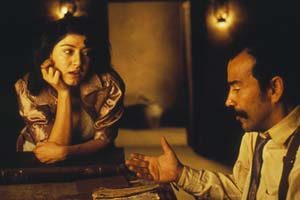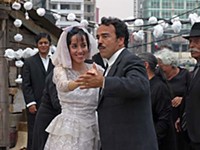
Herod's Law
1999, R, 120 min. Directed by Luis Estrada. Starring Damián Alcázar, Pedro Armendáriz Jr., Leticia Huijara, Salvador Sánchez, Alex Cox, Eduardo López Rojas, Isela Vega.
REVIEWED By Marrit Ingman, Fri., Sept. 5, 2003
Herod’s Law starts out with a bang. The bongos-and-brass score and its visual counterpoint – a fat, sweaty dude with fistfuls of money is decapitated by a torch-wielding mob, all in gorgeous 1940s sepia – suggest south-of-the-border capering reminiscent of Touch of Evil. Enter the protagonist, hapless public servant Juan Vargas (Alcazar), whose arrival in the flea-bitten rural village of San Pedro de los Saguaros slows the film to a more deliberate pace. Hand-picked by the despicable governor (Armendariz) for his stupidity, the bow-tied and obsequious Vargas transforms from ineffectual stooge to paragon of corruption – in other words, a successful politician. Along the way, he encounters a hard-bitten panderer (Vega), a moralizing doctor (Rojas), a greedy priest, and other broadly drawn allegorical figures; cult director Cox (Sid and Nancy) turns up as a wayward American who helps Vargas plunder his jurisdiction before absconding with his wife. As with too many social satires, everything is written in capital letters here, lest we fail to appreciate the thievery and dishonesty of the PRI. Estrada makes his point perhaps too well. Vargas’ transformation is so sudden and so thorough that he seems like a complete caricature – not a well-meaning idealist tempted by power, but a little dictator who quickly cottons to the titular notion: Fuck or be fucked. (Much of this action occurs in the town’s brothel.) These shortcomings, along with a needlessly slow pace and excessive length, keep Herod’s Law from greatness, but Estrada is certainly a committed and unflinching satirist. Certain moments of the film are deliciously savage: A lovely traveling shot displays a line of browbeaten peasants handing over their livestock as taxes; moments later, one of these pigs will be greedily lapping its master’s blood off the floor. Ultimately the film is nihilistic; as one character declares, "This country has no solution." It’s too didactic to be a spaghetti Western but lacks the moral compass required of a more evolved philosophical statement.
A note to readers: Bold and uncensored, The Austin Chronicle has been Austin’s independent news source for over 40 years, expressing the community’s political and environmental concerns and supporting its active cultural scene. Now more than ever, we need your support to continue supplying Austin with independent, free press. If real news is important to you, please consider making a donation of $5, $10 or whatever you can afford, to help keep our journalism on stands.
Nov. 9, 2007
Herod's Law, Luis Estrada, Damián Alcázar, Pedro Armendáriz Jr., Leticia Huijara, Salvador Sánchez, Alex Cox, Eduardo López Rojas, Isela Vega








